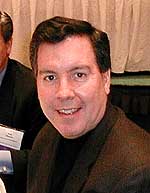By Bill Catlin
Minnesota Public Radio
March 15, 2002
|
| RealAudio |
A group of Twin Cities business and government leaders gathered Thursday night to promote an approach to economic development based on industry clusters. The idea is to improve the state's economic vitality by nurturing industries that already have a concentration in Minnesota, such as medical technology.
| |
|
|
|
||
The discussion of clusters comes in the aftermath of a vigorous debate over Minnesota's economic future. Minnesota's relative absence from the dot-com boom helped foster concerns the state wasn't doing enough to avoid falling behind in a high tech economy. Other states were committing huge sums to jump start high tech industries. Then the boom went bust, and the debate quieted.
Michael Gorman, a general partner with St. Paul Venture Capital, and a moderator at the forum, says region after region has been in hot pursuit of high tech jobs, seeking fast job growth and high wages.
"A lot of economic development has been starting and saying, 'What don't we have that we want? Let's go get that brand new industry, in which we don't really have any strength at this moment,'" says Gorman. "Clusters start from a different point. 'What do we have, what's in the soil, what is our competitive advantage, and how do we build it, strengthen it, nurture it, so that it becomes a more enduring competitive advantage?'"
McKinsey and Co. consultant Tim Welsh pointed to the example of Tucson, Ariz., which has been dubbed Optics Valley. The city helped foster a cluster by recruiting optics firms. The University of Arizona spent about $18 million to expand its Optical Services Center.
"It illustrates the point: with not necessarily huge amounts of money, thoughtful government policy in selected ways can really help spur entities and job growth that is sort of nascent in the community already," he says.
| |
|
|
|
||
Welsh says in Arizona, statewide employment in the optics field grew 81 percent, to nearly 7,000, in five years.
Minnesota has several clusters, with medical technology - led by Medtronic - arguably the most prominent. But DFL State Sen. Steve Kelley, DFL-Hopkins, told the group there isn't a broad recognition of the value of focusing on clusters in Minnesota. He said he was surprised by the approach in California, where the wine industry is supported by a University of California doctoral program on winemaking.
"They also have, apparently, committees in the Legislature that pay special attention to the wine industry. At a variety of levels there's a reinforcement of that cluster. We don't have anything like that for any of our clusters in Minnesota," Kelley says.
The program also included a panel of tech company CEOs outlining Minnesota's strengths and weaknesses. Phil Soran, an IBM alum from Colorado who founded a successful computer network data storage firm called Xiotech, praised the engineers in Minnesota.
"People work harder here than in other places. So not only do you have this deep engineering talent, you also have a work ethic," Soran says. "In Colorado, we left work a little earlier than they did here in the branch office of IBM in Minneapolis. It's in the blood, I guess."
|
"Thoughtful government policy in selected ways can really help spur entities and job growth that is sort of nascent in the community already."
- Consultant Tim Welsh, on development of industry clusters |
But a discussion devoted to a new approach to economic development also provided a platform for long-standing complaints, especially about state tax policy. Lawson Software founder and chairman Richard Lawson says it hurts recruiting.
"You go out to recruit somebody from states that don't have near the bite on them from an individual point of view, and you say, 'Would you like to go to Minnesota? And by the way, we're going to pay you what you're paid there.' And they say, 'Well, that's 8 percent less right away than what I'm paid now.' That's not an easy thing to do," Lawson said.
The discussion also offered a lesson that the old economic development approach of luring firms with tax breaks or other incentives still works. Bonnie Baskin, president of the bio-tech firm ViroMed Laboratories, says she's having trouble finding talent as she tries to nurture a spin-off company.
"I'm looking to expand that company...in Philadelphia. I have another facility in Philadelphia, because I can't find the right talent pool here to do it - in addition to being offered wonderful incentives to move to the city of Philadelphia," Baskin said.
Still, the forum organzied by two business groups, The Collaborative and the Minnesota Business Partnership, may have accomplished one goal - strengthening Minnesota's clusters simply by making people aware of them.
More Information

